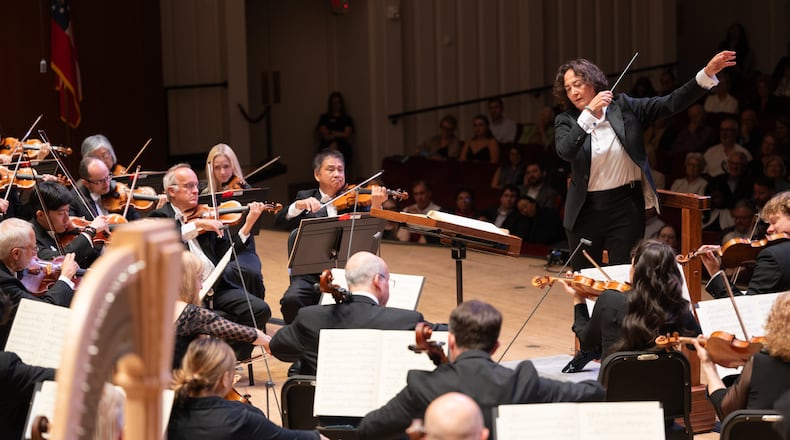On Thursday at Atlanta Symphony Hall, soprano Erika Baikoff traded phrases with the Atlanta Symphony Orchestra woodwinds, beautifully ascending a dizzying array of coloratura notes, echoed by the oboe, in Mozart’s Mass in C minor. “Et incarnatus est” proved one of the more dazzling passages in a work filled with challenging vocal writing for the guest soloists, supported by the ASO Chorus.
Soprano Julia Lezhneva, tenor Lunga Eric Hallam and bass-baritone Harold Wilson joined Baikoff as soloists. By the time Baikoff blended with the woodwinds more than halfway through the mass, awe-inspiring singing had become the norm. Lezhneva showcased a rich, powerful solo voice during “Laudamus te,” and the two sopranos blended beautifully during the duet “Domine Deus.” On “Quoniam,” the singers added Hallam for a well-balanced trio. Wilson didn’t sing until the end, joining his colleagues in a “Benedictus” quartet to end the mass.
Each soloist gave breathtaking performances throughout an introspective, sacred work. Of the choral parts, “Qui tollis” is still with me: Backed by forceful chords in the orchestra, the powerful chorus resolutely declared “have mercy upon us” in richly textured, and a bit ominous, counterpoint.
In Music Director Nathalie Stutzmann’s first performance with the chorus this season — she’ll be back in May to lead the singers in Beethoven’s Missa Solemnis — Stutzmann once again highlighted beautiful singing from the chorus, blended with expert, emotive musicianship in the orchestra. It’s impossible to wall off the real world from the concert hall, but beautiful, emotionally charged art gives us another avenue to process complex feelings. By leading the collected musicians in Mozart’s mass Thursday night, Stutzmann gave listeners the space to unpack the frustrations, joys and stresses of the day.
To start the evening, I expected a rather rote performance of one of Mozart’s most familiar symphonies. It was the start of a program anchored by a cherished mass, so a pleasant if unremarkable performance would be fine, right? The symphony is just a suitable introduction to the main choral event on the second half of the program.
Wrong. Stutzmann took a different path.
Instead of shooting for “perfectly agreeable,” Stutzmann chose satisfying and entertaining; she focused on fluid, graceful movement of melodic lines, finding animation and intensity in dynamic contrast. In the first movement, the aqueous string themes flowed from phrase to phrase, with Stutzmann shaping the direction with broad, balletic gestures. Stutzmann, leading the orchestra by her movements, at times looked like just another fan enraptured by the music, bouncing along to the band.
The ASO last played Mozart’s 40th symphony in 2018 under assistant conductor Mei-Ann Chen — also an all-Mozart concert with Lang Lang taking on the composer’s 24th piano concerto. That concert seems like two lifetimes ago. The makeup of the ASO has changed drastically since then, so the musicians were overdue to perform this hallmark work.
This is, after all, a season of hallmarks and chestnuts. The 2024-2025 program is packed with works that the best orchestras must play well: The ASO brings Mozart back briefly at the end of the month, then it’s on to Beethoven in 2025.
CONCERT REVIEW
Atlanta Symphony Orchestra and Chorus
8 p.m. Saturday. 3 p.m. Sunday. $44-$154. Symphony Hall, 1280 Peachtree St. NE, Atlanta. 404-733-5000, aso.org.
About the Author
Keep Reading
The Latest
Featured



